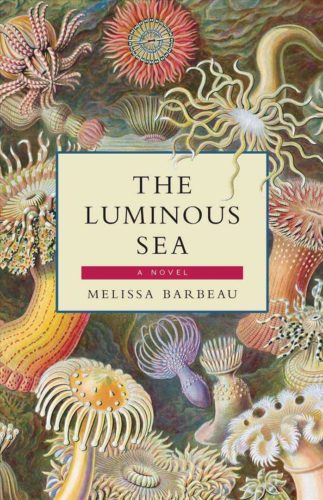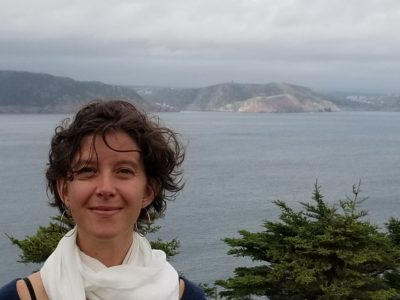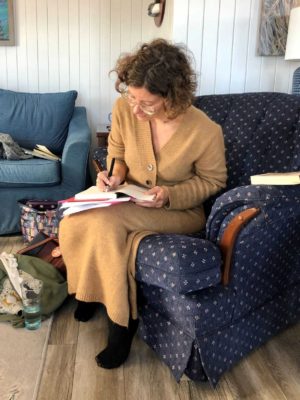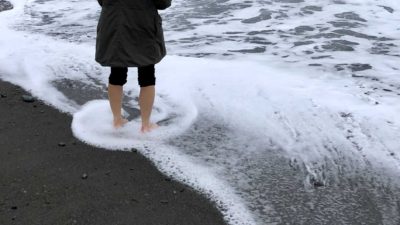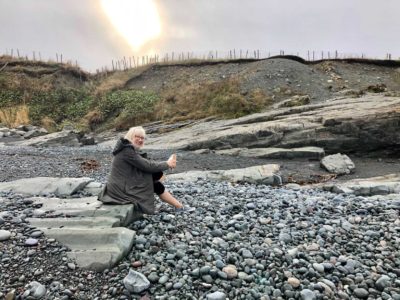[*Editor’s Note: Voting for NL Reads closes this Thursday, February 27, 12:30 p.m. NST. Visit NL Reads 2020 for more about the competing books, and to cast your vote.]
I met Melissa Barbeau, author of The Luminous Sea (Breakwater Books), in October 2019 at a writing retreat led by Toronto editor and writing instructor Allyson Latta, in Trinity, Newfoundland. Melissa spoke to our group about her new novel and the challenges of making writing a priority in her busy life. Among its other honours, The Luminous Sea is one of four contenders for the NL Reads competition, presented by the Newfoundland & Labrador Public Libraries.
Here are some highlights of my interview with Melissa.
Deborah Vail: In your Acknowledgements, you thank your family and say, “Look! I made a book!” What did you read as a child, and when did you know that you wanted to be a writer?
Melissa Barbeau: I was the kid trying to read by the light of the streetlight outside the window when I was supposed to be in bed. I wanted to be reading all the time. Besides the books I devoured from the public library, I read Reader’s Digest, Highlights Magazine, the newspaper, my brother’s MADD magazines, Archie comics, the back of the cereal box. The novels that immediately leap to mind are the Anne of Green Gables and Wizard of Oz series, A Wrinkle in Time, and lots and lots of Nancy Drew. I have always written and have always wanted to be a writer. I can remember my mother and me making books out of paper and sewing them together with wool when I was a small child.
DV: How does it feel to have your first novel published?
MB: Finding a publisher for the book has been a dream come true. Breakwater Books has been tremendous, and I have thoroughly enjoyed getting out to readings and book festivals. Meeting readers, book lovers, and other writers has been my favourite part of this experience. I feel so fortunate to have published this book in my 40s rather than my 20s. I think it has led me to appreciate these experiences in a different way than I might have when I was younger. As to the Dublin Literary Awards, it feels lovely and ridiculous! I am so grateful to the NLPL (Newfoundland and Labrador Public Libraries) for nominating me. It is beyond anything I might have hoped for the book, and I’m a little giddy about it all.
DV: How does this beautifully crafted first novel compare with your early drafts? What’s changed, and what has stayed the same?
MB: The Luminous Sea started its life as the opening scene of a short story involving the dissection of a sea creature on someone’s kitchen table. It changed and evolved from there. It let me know, pretty early on, that it intended to be a book, as the characters and their struggles emerged more fully. Once I had written a few key scenes (the opening, the ending, and one pivotal scene in the middle), I wrote straight through from beginning to end. There was not a lot of structural change from that early draft to the final novel. My editing process was more about going back and making that skeleton story richer.
DV: The Luminous Sea is written in present tense with different points of view. Why did you choose this approach?
MB: I like the present tense because it feels so immediate to me. As to point of view, I have to say I am not a big fan of first person. I find it an incredibly difficult thing for a writer to pull off; I think you have to be such a skilled craftsman to make it work seamlessly. That said, I did want the reader to feel things with my characters, to be in their heads, so I chose a close third person. The story is told from the points of view of three women in Damson Cove, because I wanted to show how their individual experiences of events in the novel interweave and how their stories exist in conversation with each other.
DV: What section of a bookstore would you like to find your novel in, and why? There is magic and myth woven through this work of literary fiction.
MB: The Newfoundland section, of course! There is such a glut of amazing Newfoundland writers that every bookstore in Canada could dedicate a whole section. Genre-wise I wouldn’t mind rubbing shoulders with Gabriel García Márquez and Jeanette Winterson, Isabel Allende and Thomas King in the magic realism section. I love the idea of taking a story that could be set in mostly ordinary circumstances and injecting it with a dose of magic or unreality.
DV: Your story is set in a fictitious town on the very real coast of Newfoundland. What are the pros and cons of setting your novel in an area you are very familiar with?
MB: This book was my love letter to Conception Bay North, Newfoundland. It’s the part of Newfoundland where my mother was born and raised and where I absolutely love to be. The pro is how easily I could slip into that place; it feels like a part of me (or I a part of it). The worry, of course, is making sure you do it right – that you are faithful and true to the spirit of that place and its people.
DV: One of your characters is a woman that readers commonly hate. Are you surprised by some of the feedback you’ve received, and what was your objective for crafting a character with so little empathy?
MB: I have been very surprised with how strongly some readers have reacted to Colleen. In writing the book, I purposefully explored the idea of a female character who does not seem to be outwardly sympathetic toward other females. When Colleen’s assistant Vivienne is dealt a heavy blow, Colleen does not act in a way that seems traditionally supportive. Colleen considers herself a feminist but she in no way sees herself as part of a “sisterhood.” She is a challenging, self-serving character, and very ambitious, but (I think) not as despicable as some readers find her. She has her reasons for doing things and for acting a certain way, not least of which is her struggle to make a career as a female professional in a traditionally male-dominated field. I think what some readers might see as a lack of empathy and compassion in Colleen would be tagged in a male character as “being driven.” I quite love her.
DV: Without revealing too much of the story, which one of your characters do you identify with the most strongly, and why?
MB: I do see myself in Colleen. Every character contains pieces of the writer, and I see myself in all of my characters, but Colleen is in some ways my shadow self. We both share ambition and work ethic, and both want to succeed. Colleen mostly acts with her own self-interests in mind; but abandoning other things in your life in order to write is also self-serving. I write to serve my own ambitions and for my own creative and artistic fulfillment. I think there are qualities that we share, but they are distributed in different proportions and manifest themselves differently.
DV: What can you tell us about the unique design of your cover?
MB: I am in love with the cover of this book! It was designed by Rhonda Molloy at Breakwater and is a reproduction of an illustration by a late 19th-century German scientist and artist named Ernst Haeckel. When James Langer at Breakwater asked if I had thoughts on a cover, I suggested we might look for something like an antique bookplate, and this is what he came back with. Haeckel was a contemporary of Darwin, and he spent time in the field studying all kinds of flora and fauna and theorized about natural selection. His masterpiece is the most gorgeous book called Kunstformen der Natur (Art Forms in Nature). It contains over 100 colour plates of all kinds of living things, and I am so happy one was chosen for the cover. I’ve seen a reproduction of the complete volume in real life, and it is sublime.
DV: How do you maintain a writing schedule while juggling work and family? What advice can you offer other writers?
MB: My advice would be to acknowledge that it isn’t easy to juggle work/writing/volunteering/family. There are many days when it is a struggle. But like anyone with a career and multiple obligations (especially women) you believe you just have to put your head down and do it. It will not always be pretty. It will not always feel good. For me, writing a novel meant getting up early and staying up late, fitting it in wherever I could. It meant sometimes being sleep-deprived heading to work. It meant giving up some things to writing – including a spotlessly clean house and being there for everyone all the time. It sometimes meant not being one hundred percent attentive to my children and my husband. It meant not always making a sensible supper and having the children scramble themselves some eggs instead. You need to believe that your writing – the work you’re doing – is important and worthwhile, and you have to sit down and do it when circumstances aren’t ideal. You have to be selfish. And you need to be compassionate with yourself, and not give up during those times when it is truly impossible to find time to write.
DV: You are a founding member of the Port Authority Writing Group. What, in your opinion, makes a writing group successful?
MB: I love the Port Authority. They are the most brilliant, generous, hilarious group of writers (and people!), and I am so very fortunate to be associated with them. I think a good writing group hinges on generosity and honesty. You need to be open and frank with one another, willing to spend the time on other people’s work, and open to their notes even if you don’t agree with them. We meet every two weeks or so and send words around for critique before every meeting, and you have to put the energy into the careful reading of the others’ work. I think you also need to build trust in one another, to be kind but still say what needs to be said. I think it’s a good thing if you are different from one another and come from different experiences. That said, not every writing group is the right one. I do think a kind of magic happened when the PA came about. If it feels like you haven’t found your people, you need to keep looking.
DV: What’s your next writing project?
MB: I’m working on a new novel! It’s just barely hatched, really only a fledgling, so I’m being very gentle with it and protective and trying not to talk about it too much.
DV: As your career as an accomplished writer unfolds, what would you consider a triumph?
MB: The Luminous Sea is my first novel, and I hardly feel accomplished yet. If I have my wish as a writer, it’s that I can keep doing this. Keep working, keep writing, keep publishing. The dream is to make writing a full-time job and still be in a position to support my family. I’m working every day to make this a forever gig.
MELISSA BARBEAU’s The Luminous Sea is longlisted for the 2020 Dublin Literary Award, and a finalist for NL Reads. It was a finalist for the BMO Winterset Award, a gold medal winner at the Independent Publisher Book Awards, a finalist for a Miramachi Reader’s Very Best Book Award for Best First Book, and an inaugural Briny Books selection. The novel was also a finalist for a 2019 Next Generation Indie Book Award (Best Cover Design). Melissa’s short stories have been published in Racket: New Writing from Newfoundland, Newfoundland Quarterly, Paragon, and The Cuffer Anthology. She is the recipient of two Newfoundland and Labrador Arts and Letters Awards, and the Cox and Palmer Award for Emerging Writers. She is a founding member of the illustrious Port Authority Writing Group.
Melissa has managed – so far – to successfully avoid being completely absorbed by the world of adults by teaching English and Instrumental Music to junior high students far more lively and cool than she. She lives in Torbay, Newfoundland, with her husband and a glorious gaggle of children, though her heart resides in Freshwater, Conception Bay.
DEBORAH VAIL holds an MFA in Creative Writing from the University of British Columbia in Vancouver. She’s published fiction, creative nonfiction, and book reviews. Her interview with Sonja Boon about her memoir What the Oceans Remember appeared in Prism International online, and her review of that book is forthcoming in The Antigonish Review. She also has short fiction forthcoming in The New Quarterly. Deborah lives in BC’s Fraser Valley.
